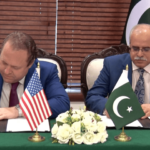Washington
28 August 2017
(Daily Dawn, Pakistan) The talks between Pakistan and the US on the new American strategy for South Asia got another setback on Sunday when Washington learned from Islamabad that Pakistan would like to reschedule talks with a senior US official that were to begin on Monday.
“The visit of acting Assistant Secretary [Alice] Wells has been postponed on Pakistan’s
request. It will be rescheduled at a mutually convenient time,” a senior State Department
official told reporters on Sunday.
The rescheduling of Ms Wells’ visit was the second such request from Islamabad in less than
a week. Pakistan had earlier requested rescheduling of visit to Washington of its Foreign
Minister Khawaja Asif, who was expected in the US capital on Aug 25 on an invitation from
Secretary of State Rex Tillerson.
Apparently a third visit, that of a delegation led by senior White House National Security
Council official Lisa Curtis, will also be rescheduled. Ms Curtis, who played a key role in
formulating the new US strategy for South Asia, was expected to arrive in Islamabad this
week.
The proposed talks on three levels — cabinet, foreign affairs and security — were aimed to explore how the United States and Pakistan could rebuild their relations under the guidelines set by President Donald Trump in his Aug 21 speech.
Mr Trump used that speech to announce the new strategy, which denounced Pakistan for
allegedly allowing terrorists to maintain safe havens inside its territory. It also gave
India a bigger role in Afghanistan, stoking fears in Islamabad that India would use this
opportunity for stirring troubles in the bordering areas of Pakistan.
The strategy also suggested that punitive actions could be taken against Pakistan if it did
not stop alleged cross-border attacks on US and Afghan troops.
The State Department had announced on Saturday that Ms Wells would arrive in Islamabad on
Monday for talks on the administration’s South Asia strategy. This would have been her
second visit to Islamabad in less than a month.
Ms Wells, who is also Washington’s acting Special Representative for Afghanistan and
Pakistan, made her “introductory trip” to Islamabad on Aug 3 and 4, when she met Foreign
Minister Asif, Foreign Secretary Tehmina Janjua, Finance Minister Ishaq Dar, and Chairman
of the Joint Chiefs of Staff Committee General Zubair Hayat. She also visited New Delhi
during that trip.
As Islamabad reached out to its allies, particularly China, for consultations on the US
strategy, observers in Washington warned that the new policy would push Pakistan further
away from the United States.
Laurel Miller, who was Washington’s special envoy to Afghanistan and Pakistan till June,
warned that the US decision to give a greater role to India in Afghanistan would
“significantly antagonise the Pakistanis” as it “pushes the Pakistanis’ most sensitive
buttons”.
The possibility that the new strategy could also cause Islamabad to close the US supply
route to Afghanistan was also raised at a news briefing by a senior US official who
acknowledged that Washington still counted on the lines of communications on ground that
passed through Pakistan. President Trump’s decision to enhance US military presence in
Afghanistan increases the importance of this supply line.
Responding to a question, the US official said that while developing the new strategy, the
United States did consider the threat posed to ground lines of communications to Afghanistan
that ran through Pakistan if India got more involved in Afghanistan.
“The ground lines of communications in Pakistan are very important to the US. The United
States has had gone through periods where it had to rely more on Northern routes, which
[are] more expensive and not the best option,” the official said. “So, we do count on those
lines of communications in Pakistan.”
Disclaimer: Asian Telegraph Qatar do not accept any responsibility for any comment posted on our website. Any comment does not necessarily represent the views of the Asian Telegraph Qatar, unless where specifically stated otherwise. We reserve the right to unpublish, or delete parts or the entirety of any comments that deemed to be non-conducive to the discussion.








